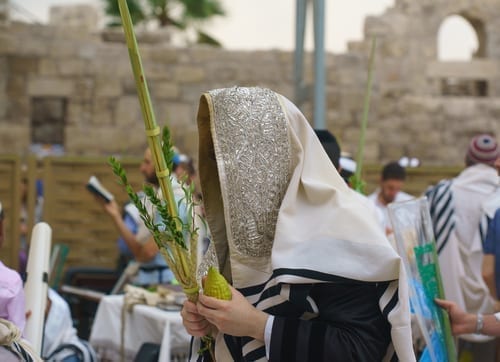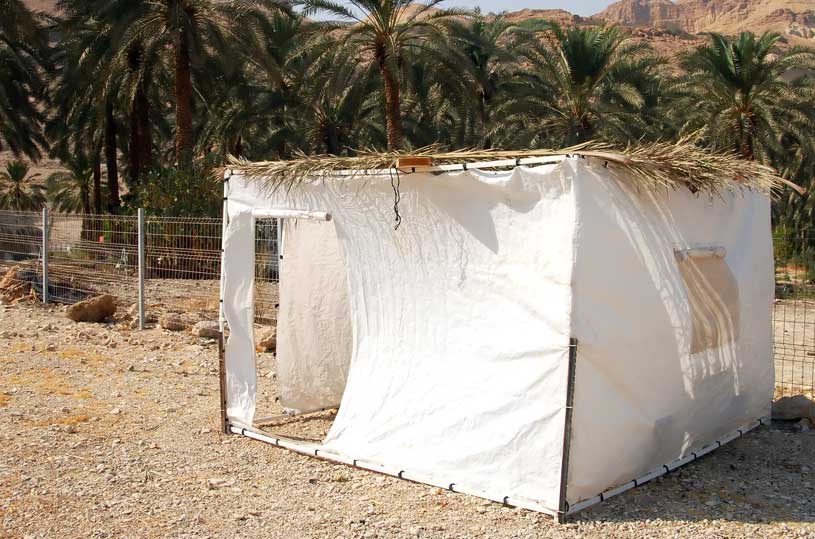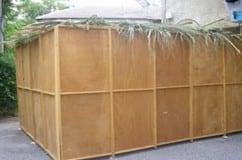The mitzvah in the Torah that obligates us to sit in the sukkah for seven days is “Kol ha’ezrach b’Yisrael yeshvu b’sukkot.” The basic meaning of the word ezrach is “citizen,” meaning that every member of the Jewish nation should sit in the sukkah. Rav Eliyahu Dessler adds another beautiful explanation of the word. He says ezrach is derived from the word “shining,” as in, “Hashemesh zorachat.” The real test of Jewish membership is whether we are able to shine in the sukkah, when we are in a situation of discomfort. The one who is able to do so is a real Jew.
We all know the Gemara about the test Hashem will give the non-Jews when they complain that Mashiach is coming to redeem the Jewish nation alone. He will offer them the opportunity to observe only one mitzvah, the mitzvah of sukkah, but the heat will be so unbearable that they will escape from the sukkah and kick it on the way out. Our test is the same one: Will we continue to “shine” and remain happy even when the situation is not as comfortable as we’d like? Will we lash out at others, at the people we love most, or will we maintain our composure and prove our membership in the exalted nation? During the week of Sukkot, we are subjected to many uncomfortable situations—uninvited guests, a constant mess, cramped quarters. Our mission is to maintain our shining light and to welcome all of this discomfort with happiness. Unfortunately, the non-Jewish priority of comfort, of kicking the sukkah because it’s just too hot, has penetrated our circles. We’ve forgotten what it means to embrace our tiny wooden huts, to sweat for a mitzvah, to experience true material-free happiness.
Hakadosh Baruch Hu says to us, “Haporeis sukkat shalom”—your sukkah may not be comfortable, but I will compensate for everything you lack, making it shaleim, complete. Not everything in life is meant to be easy, my dear child. Sometimes, keeping your mouth shut, or opening it when necessary, takes more control than you ever imagined you had, but if you do your prusah, your “slice,” I will do mine. Go that extra mile for Me, sweat it out a bit, and I will make your home a beautiful place, one that shines inside and out. If we are honest with ourselves, we know that as women, we face many challenges on Sukkot. We know that “ishto zu beito”; the woman is referred to as a “home” because women thrive on routine, on stability.
How can we be happy and shining when we’re experiencing its antithesis, expelled from the comfort of our homes for an entire week, carrying heavily laden trays in and out several times a day? The answer, dear women, is so telling. Sukkot brings us a message that we must carry with us all year long; it reminds us that while we are comfortably ensconced in our physical homes all year long, we are really homeless. It is particularly during Sukkot, of all days of the year, that we experience the beauty of a real home. During the year, when we’re living at home, we’re actually living out of the home. Instead of speaking with our loved ones face to face, we correspond with hundreds of unknown others on Facebook. Instead of opening the windows and allowing the sunshine to fill our homes, we’re immersed in Windows. In place of the laughter and family interaction that makes a house a home, we sit in a deathly silence, glued to our screens, sometimes emitting a chuckle that nobody else even notices.
What’s real Yiddishe nachat? It’s not what non-Jews call nachat. For us, it’s the balagan—the laughter, the fingerprints, the signs of life—that should make our hearts swell with pride. This is what every Jewish family should merit, and this is what we should appreciate in our homes. Hakadosh Baruch Hu, in His deep wisdom, foresaw the tragic threats to family life that future generations would face. Thus He said to us, “I will make you homeless for seven days. I will teach you what a real home is meant to look like.” When you step outside into your sukkah, you will pay attention to the weather. Out there, without central air or heating, you will reconnect with nature. Yes, technology does have its benefits; it has its time and place, but we mustn’t forget about the joys nature has to offer. When you step outside into your sukkah, you will realize that you have neighbors— people whose lives you can touch.When you step outside into your sukkah, you will be forced to live with the minimum, bringing only what’s necessary to your tiny table. You will experience the spirituality that comes with cutting back on materialism. And when all of you sit in that tiny hut together, parents and children, huddling together, eating a festive meal as you catch up on each other’s lives, singing beautiful songs in harmony, that’s what home life is all about. Sukkot isn’t a time of homelessness; ironically, it has become the only week of the year in which we experience the essence of a real home. “V’samachta b’chagecha v’hayitah ach sameach”—when we create that cozy home atmosphere, it is impossible not to experience true happiness, even though we are expelled from the physical comfort of our year-round homes, shivering in the autumn cold.
And while we are sitting there, focusing on fulfilling the mitzvah of simchah, we can keep in mind some additional secrets of happiness that the chag offers us: The Rambam teaches in hilchot lulav, “Hasimchah sheyismach adam be’asiyat hamitzvah avodah gedolah hi,” much work is necessary for a person to be happy while fulfilling a mitzvah. I always explain these words to mean that the ultimate simchah is derived from avodah gedolah, hard work. If you want to experience true happiness, allow yourself to sweat. As you’re walking up and down those stairs, soup tureen in hand, keep this in mind. Physical comforts offer only temporary pleasure. It is the toil of the heart and soul that stir within us a happiness that is never-ending. The more you sweat for a mitzvah, the greater your joy will be. Of course, being healthy does much to boost our happiness as well. When we stand with the arba minim in our hands, there is no better time to contemplate this. Each of the four species symbolizes a vital organ, and when we perform the mitzvah, we should take the time to pray for physical and spiritual health. The lulav symbolizes the spine, the hadasim the eyes (ayin tovah), the aravot the lips and everything concerning the mouth (purity of speech), and the etrog symbolizes the heart (lev tov, having the capacity to love and be loved). And one last beautiful secret to happiness that Sukkot has to offer is that of beauty. If there’s a chag that really speaks of beauty, it is Sukkot.
Our focus during these seven days is on the principle “Zeh Keili v’anveihu.” We invest a great deal of effort beautifying our temporary homes with nice dishes and table linen and decorating its walls and ceiling, because beauty makes us happy. In speaking of beauty, I must speak of tzniut, the ultimate beauty of the Jewish woman. The Gemara speaks about tzniut when it discusses the renowned custom of simchat beit hasho’eivah. In preparation for this celebratory event, a special ezrat nashim, the “Tikkun Hagadol,” was constructed each year, and this is where the women sat to watch the festivities. Although the blueprint for the Beit Hamikdash was perfect, the chachamim still felt the need to add this room every Sukkot.
Asks the Bnei Yissachar of Dinov: If tzniut is so important, why didn’t the women stay home altogether? Why was it necessary to construct an entire room for them every year? And he answers beautifullythat the real simchah is when everyone celebrates together, the women dressed in their finest, wearing the jewels their husbands bought them in honor of the chag, even while they remain separate. This was the beauty of the simchat beit hasho’eivah— the perfect blend of the material and the spiritual.
True simchah comes about when we use all of our material resources to create something spiritual, and there is no better time of year to create that unique fusion than Sukkot. As we enter our cozy and beautiful little huts this year, let us remember to inhale the happiness that surrounds us, to take notice of the blessings, the true Yiddishe nachat that fills every crevice, and to thank Hakadosh Baruch Hu for it all. And when we are forced to leave the sukkah after seven days, may we merit to transplant the lessons of real home life in our homes every day of the year ahead.





